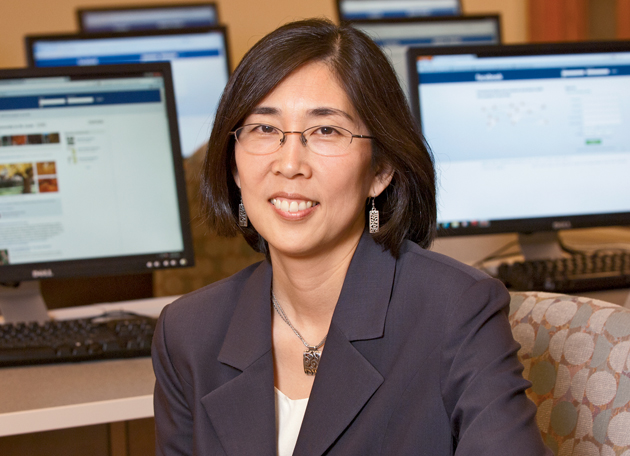
With unemployment hovering around 9 percent nationally, Americans are understandably jittery about the economy. However, even those who feel secure in their jobs may not be as safe as they think from arbitrary firing, invasions of privacy, or even discrimination in the workplace.
That’s the message from Pauline Kim, JD, the Charles Nagel Professor of Constitutional Law and Political Science at the university’s School of Law.
“Employees have a sense of fairness and assume the law is about protecting them against unfair treatment. But their assumptions are often mistaken.”
—Pauline Kim, JD
“Employees have a sense of fairness and assume the law is about protecting them against unfair treatment,” Kim says. “But their assumptions are often mistaken.”
Most employees do not understand the “employment-at-will” doctrine. Employees classified as “at-will” — which includes most non-union employees — can be discharged with or without “cause.” “The employer does not have to provide a good reason, or even to articulate a business-related justification, for a discharge to be legal,” Kim explains.
“Professor Kim is perhaps best-known for her pathbreaking empirical research on the employment at-will rule,” says Marion Crain, JD, the Wiley B. Rutledge Professor of Law. “She has documented the widespread misunderstanding of the at-will rule among workers.”
Furthermore, Kim’s research demonstrates that employees are slow to change their view even when presented with statements about their at-will status. As a result, workers may not understand the extent to which they are vulnerable to firings that may appear arbitrary or unjustified to them.
Privacy and the wild, wild web
Privacy is another area where employees often misunderstand their legal rights. “Employees often have a false sense that aspects of their personal life or seemingly private communications are off-limits to employers,” Kim says. “In fact, employers can and do inquire into these matters and may make employment decisions based on what they discover.”
“Pauline also is widely regarded as an expert on workplace privacy issues,” Crain says. “Her work on the harms posed by workplace testing and argument for a ‘zone of privacy’ to preserve individual autonomy earned her the invitation to deliver the [IIT] Chicago-Kent College of Law 2011 Kenneth M. Piper Lecture. That is an honor bestowed only upon scholars who have distinguished themselves in the labor and employment field.”
Kim’s Piper Lecture — “Privacy, Loyalty and Free Speech: Pushing the Boundaries of the Modern Employment Relationship” — delivered in April 2011, is the basis for an upcoming journal article to be published in the Chicago-Kent Law Review.
“The law is struggling to catch up, to determine what employer uses are legitimate and when employees should be able to expect some privacy.”
—Pauline Kim, JD
“With the growing use of technology in the workplace, employee privacy is more at risk than ever before,” Kim warns. “Employer review of email, websites visited on company computers, and even statements about companies made on employees’ own computers in their ‘free time’ have all been used to discipline, discriminate against, or fire employees in recent years. The law is struggling to catch up, to determine what employer uses are legitimate and when employees should be able to expect some privacy.”
Comments on social-networking sites like Facebook can cause employees problems at work. A recent case from Hartford, Conn., involved an employee who had complained to co-workers about her boss on the popular site. When her boss learned of the post some time later, the employee was fired. The National Labor Relations Board issued a charge against the employer because the comments potentially involved concerted activity by the employees, which is protected by law. The case was eventually settled.
“Employees think they are communicating in a private space, but if their statements go on the Web, they should not assume that their employers cannot access and use that information,” Kim says. Employers increasingly have an interest in what their employees are doing online. They are concerned about statements that might damage the reputation or business interests of a company, or stir up dissension among co-workers.
In another recent case, Stengart v. Loving Care Agency, Inc., an employee complained when her former employer accessed emails she had sent to her lawyer. The employee, Marina Stengart, had used a company-issued laptop to access her personal, password-protected Yahoo account to send emails to her attorney about possible discrimination at her company. After she resigned, the company used forensic tools to recover copies of the emails that were stored on the hard drive.
“Technology can be deceiving,” Kim says. “Electronic communications can provide an illusion of solitude and privacy.” In the Stengart case, the employee simply did not understand that her email could be recovered later. The New Jersey Supreme Court sided with her, ruling that the email communications were protected by the attorney-client privilege and should not have been retained by the employer.
“Privacy laws are built on a 20th-century model in which there was a clearer separation of work and home,” Kim says. “But that boundary is now blurring because of advances in technology and changes in the structure of the workplace and the family.” Specifically, it is a consequence of the increase in dual-earner couples as well as single-parent families mixing with the ubiquitousness of smartphones and remote-access technologies. “Therefore, the traditional legal boundaries protecting individual privacy are less clear,” Kim adds.
Wal-mart V. Dukes: “raising the bar” For class-action lawsuits
In addition to her research on employee rights, Kim also writes and teaches about the litigation system and judicial decision-making. Last summer, those interests came together when the U.S. Supreme Court rendered its decision in Wal-Mart v. Dukes, a case that challenged the retail giant’s personnel practices, arguing that it discriminates against its female employees.
“The suit was initially filed in the U.S. District Court in San Francisco 10 years ago,” Kim explains. “It started with a few workers — one of them being Betty Dukes — who were suing on behalf of all women employed by Walmart. They claimed that they were paid less than men with the same jobs and experience, and that their opportunities for promotion were fewer.” While two-thirds of Walmart’s hourly employees are female, only one-third of the company’s managers are. The higher up the corporate ladder one goes, the fewer women there are.
The precise issue decided by the Supreme Court, however, was not whether discrimination had occurred, but rather how Rule 23 of the Federal Rules of Civil Procedure — the law that governs the procedure and conduct of class-action suits brought in federal courts — should be interpreted.
“The court was skeptical about whether this large group of employees was similar enough to constitute a ‘class.’”
—Pauline Kim, JD
The sheer magnitude of the case — the women who made up the would-be “class” represented by the suit could have been more than a million employees — made the case “really remarkable,” Kim says.
“The court was skeptical about whether this large group of employees was similar enough to constitute a ‘class,’” Kim says. “In the end, the justices didn’t see enough common issues among the female employees. They viewed any discrimination that might have occurred in the company as discrete acts by different supervisors.”
On June 10, 2011, the court rejected the plaintiff’s anecdotal, statistical and social science evidence, and ruled that the case could not continue as a class-action lawsuit. It was a big victory for Walmart and “raised the bar for plaintiff class actions,” Kim says.
According to Kim, the case is significant for both class-action litigation and the law of employment discrimination. “It will be harder for plaintiffs to satisfy the requirement for a class action. And it will be harder for employees to establish that systemic employer practices are causing employment discrimination to occur.”
Changing expectations
Kim has been teaching employment law since she joined the law faculty at Washington University in 1994. Over the years, she has noticed changes in how her students approach some of the issues raised in the course. She says, “My students are very technically savvy, and they have very different expectations of privacy compared with students in earlier years when the Internet was relatively new.”
In addition, Kim explains that students’ views are influenced by prevailing labor market conditions. “In tough economic times, they are more receptive to arguments about how lack of bargaining power limits the choices of some workers,” she says. On the other hand, they no longer seem to believe in the lifetime career job, but instead expect to hold a number of jobs over the course of their own careers.
Kim also teaches civil procedure as well as a seminar on court and judicial decision-making. “I enjoy working with students to prepare them professionally for the practice of law and to help them understand the forces that are shaping the law,” she says. “In the employment context, dramatic changes in the workplace are pushing the boundaries of many traditional employment law doctrines, creating policy challenges that they will have to confront as practicing lawyers.”
Timothy J. Fox is the law school’s marketing & communications coordinator.

Comments and respectful dialogue are encouraged, but content will be moderated. Please, no personal attacks, obscenity or profanity, selling of commercial products, or endorsements of political candidates or positions. We reserve the right to remove any inappropriate comments. We also cannot address individual medical concerns or provide medical advice in this forum.